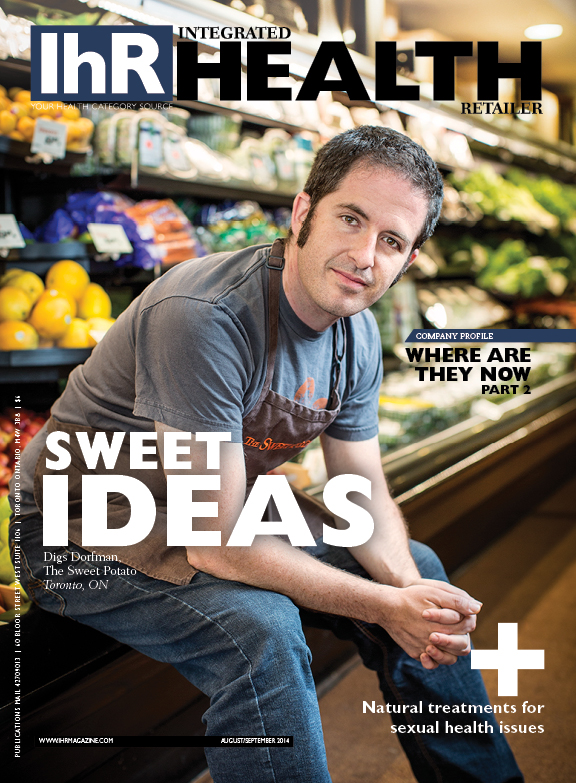Sweet Ideas
AFTER FINDING HIMSELF UNEXPECTEDLY IN THE GROCERY BUSINESS, DIGS DORFMAN BRINGS THE SWEET POTATO TO SUCCESS AND BEYOND.
BY KAVITA SABHARWAL
PHOTOGRAPHY BY MIKE FORD
Digs Dorfman did not have a traditional transition into the grocery business. Though he is a bit of an accidental grocer, he claims that the ability to choose the best produce runs in his blood, as his grandfather owned Sunnybrook Farms, once the largest independent grocery chain in Ontario, prior to his retirement.
After receiving his music degree in Montreal, Dorfman moved back to Toronto and began running a weekend organic market in High Park from 2005 to 2008 during summers, selling fruits, vegetables and baked goods.
While he enjoyed running the market, Dorfman had not considered other options for expanding his small business. That changed when loyal customers requested he open a store in the neighbourhood that could operate year-round. Once that seed was planted in 2008, it took him only eight months to open The Sweet Potato.
COMMUNITY COMES FIRST
It is clear that the Junction, the colourful and historic Toronto neighbourhood where the store is located, was chosen as The Sweet Potato’s home base for the sense of community that exists with its patrons.
Indeed, Dorfman and the entire ‘Yam Fam’ love the neighbourhood and its most common demographic of what Dorfman refers to as ‘parent gangs’ – young families with several children. Also frequenting the store are single professionals that reside in the new condominium developments in the neighbourhood and an elderly population that is increasingly interested in healthful living.
An aspect of the store that encourages repeat visits is the feeling of community, a cornerstone of Dorfman’s business model. He prefers to invest in community eventssuch as the annual Halloween pumpkin carving festival in the Junction together with the neighbourhood Business Improvement Area. The store gives away about 250 pumpkins to children to carve their own Jack-o-Lanterns, withfree food and carnival games also provided to add to the festive spirit. He estimates that last year, the company donated nearly $15,000 to various community events, although the return on that investment is unknown.
“That’s the type of thing we like doing to promote our store. From the start, I always said if we just do this for a few years, people will really see that we love the community and this type of advertising will earn us a reputation you can’t buy with awesome ads,” he says.
Dorfman supplements that community marketing approach with the Potato Post, the store’s newsletter. He also knows that other than social media, word-of-mouth really works to bring in new customers to his store.
“We really work hard to build our reputation and our name in the community and we really like positive word of mouth. People telling their friends and family, that works better than anything,” he says.
CULTIVATING THE BUSINESS
While The Sweet Potato is currently 8,000 square feet, including the 3,500 square foot sales floor and the back area that houses offices and merchandise overflow, the size of the store cannot accommodate its skyrocketing sales. That is why the staff of about 35 full-time employees plans to move to an 18,000 square foot space a few blocks from its current location.
“That would make us the second largest in the city. We’re really excited about that,” says Dorfman. “The community has given us a flood of support since we announced that we even might be thinking about it.”
Moving to a larger spot puts other plans on the back burner, namely starting an E-commerce site and opening more locations.
“Once we have more space and we increase the economy of our scale of buying, that is definitely an option we’ll pursue, though it’s pretty far down the line,” says Dorfman. “I feel like there are some other neighbourhoods in the city and definitely some other places in Ontario where we would fit in well. We are still in the very beginning stages of that stuff. We’ve really poured all of our energy in the past couple of years into building this larger store that we’re hoping to open by the end of the year.”
Although they do some planning, Dorfman believes analytics can only tell you so much. “We don’t forecast more than a few months ahead. We set up some promotional calendars with some of the larger size vendors. I know we’ll be selling cereal and almond milk all year, so that’s the type of thing that we’ll forecast a little bit,” says Dorfman. “It’s really important to have your finger on the pulse of what’s going on, and trends in food can happen so quickly. It’s often seasonal and weather dependent.”
Dorfman cites this past winter as an example, with its ice storm and cold temperatures causing his store to sell root vegetables far later in the season than they usually would. Despite the terrible winter weather, he says that summer is the store’s worst shopping season for two reasons. The first is that Toronto is not a summer destination, with its residents often visiting cottages for periods of time and children staying at summer camps. The second is that the store loses staff most often during the summer because they are often young people who prefer to spend their summers traveling, or they go back to school in the fall.
NURTURING RELATIONSHIPS
The reason Dorfman is able to offer noticeably lower prices on his produce is because he has figured out the balance of giving his customers the low prices they appreciate while paying farmers a fair price for their products.
“One of the advantages that I got out of running the High Park organic market for a couple of years is I met a ton of farmers and developed really good relationships with them,” says Dorfman. “We make sure to never underpay any farmers. At the same time I want to put on deals with produce. That’s really challenging. We’ve managed to do it successfully and the farmers that we’ve worked with are really happy to be working with us.”
In addition, Dorfman’s method of dealing directly with growers at a farmer’s market allows him to carry fresher, more local produce at better prices than chain stores due to their wide-scale buying.
Another relationship that Dorfman takes seriously is the one between him and his employees, who are trained based on their department and participate in information sessions relevant to the business to keep them informed.
Dorfman keeps the Sweet Potato’s position in the marketplace confidential, however he does note that his store’s success compared to others in the same field is caused in part by the friendliness of his sales staff, which keeps customers coming back.
Dorfman himself takes care of the produce buying due to his farmer’s market connections, while three other members of staff take care of the purchasing for the rest of the store.
BUILDING ACHIEVEMENTS
The Sweet Potato team prides itself on the store’s low prices, especially compared to its competitors. “We work very hard to provide the best local and organic food at the cheapest price we possibly can, and that’s definitely a different business model than most of the stores out there,” says Dorfman. “We’ve done some price comparisons with other stores. In particular with the fresh product, we find that we’re consistently 20 to 30 per cent cheaper. That’s dramatic.”
As might be expected for an organic grocery store at this level, Dorfman has very strict rules about the products that can be allowed in-store. He also has his own rules for the produce department: local first, organic second. However, a first choice is always local and organic together. The mix of produce in the store is generally 90 per cent organic, and 10 per cent local conventional produce, although it depends on the season. If a product is not available locally or as an organic import, it will not get past the door.
Among the milestones that Dorfman is proud to have achieved, he counts winning Now Magazine’s Best Organic Grocery Store in the City award at the top of his achievements.
He is also proud to mention the store had to be renovated to add more cash registers about one year ago in order to process customers more quickly.
“That was a bit of a feather in my cap because [when I opened the store] I thought to myself; we’re never going to be so busy that we’ll need more cashiers. We’re so much busier than that,” he says.
Dorfman and his team have truly earned these accolades; putting everything they have into the store to get it to the level it is at now. In its new location, The Sweet Potato will easily be able to accommodate its steadily growing numbers more comfortably while keeping its prices low and its customers happy. And that fact is truly sweet.









